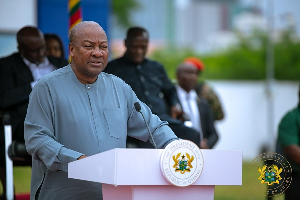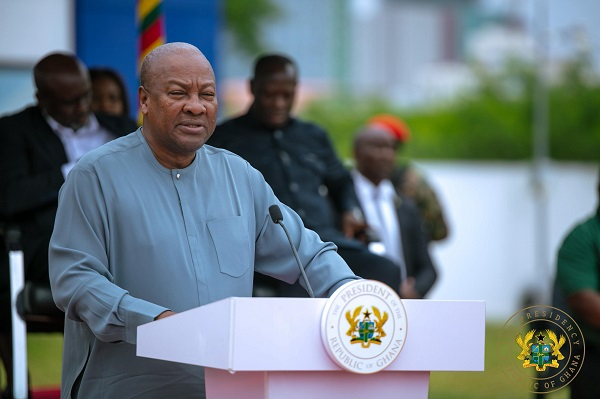 John Dramani Mahama is the President of Ghana
John Dramani Mahama is the President of Ghana
As Ghana navigates through a critical phase of economic recovery, there is a growing national call for the ruling government to adopt a higher standard of governance, one that transcends mere comparisons with the past and embraces a bold, forward-looking vision. For too long, Ghanaian politics has been trapped in a cycle where successive governments justify their performance by comparing themselves to the perceived failures of their predecessors. In recent public discourses, the ruling government has frequently cited the shortcomings of the previous administration as a point of reference to defend its own performance.
While holding past administrations accountable is necessary, governance should not be reduced to a race to the bottom. Though, such comparisons may offer temporal political leverage, they present a significant risk of shifting focus away from the core objective of establishing a future-oriented, accountable, and high-performing government that sets new standards for governance rather than merely outperforming a struggling past.
The argument that the ruling government is performing better than the previous administration in certain sectors be it infrastructure, education, health, or macroeconomic indicators may sound politically comforting. However, this form of benchmarking sets a dangerously low bar for governance. It assumes that the limitations of the past are acceptable baselines for the future, when in fact, the socioeconomic challenges facing Ghana today require bold, innovative, and far-reaching policy interventions beyond what either party has so far delivered.
The global economic climate has evolved, presenting both challenges and opportunities. Rising youth unemployment, the need for green and digital transformation, and structural fiscal imbalances all require a paradigm shift. This calls for the ruling government to set a new national standard, not one rooted in partisanship or retrospective comparisons, but in a clear, future-forward vision that delivers measurable results and restores pride to governance.
The current administration was elected on the back of promises to “reset” the Ghanaian economy, restore public confidence, and renew hope. That mandate is not about performing relatively better than predecessors; it is about achieving absolute progress. Benchmarking against past failures only serves to normalize weakness and stagnation. As custodians of the state, the current leadership has the opportunity to define a new era of governance, one rooted in excellence, transparency, and a genuine desire to uplift every Ghanaian.
Indeed, true leadership does not look back to outpace a rival, it looks forward to break new ground. The ruling government must see itself not as a competitor in a political relay, but as a pacesetter for a new Ghana. This means setting ambitious targets in education reform, public service delivery, agricultural modernization, and industrial growth.
It also means institutionalizing transparency, accountability, and citizen-centered policymaking. Ultimately, progress should not be defined by outperforming the previous administration. It should be measured by how effectively the ruling government uplifts communities, empowers citizens, and steers Ghana toward inclusive and sustainable development.
Ghanaians have grown increasingly frustrated with the prevailing culture where doing the bare minimum is celebrated, while transformational thinking is sidelined. especially at a time when global economic shifts and internal vulnerabilities require agility, foresight, and excellence. Resetting the Ghanaian economy demands more than just a better version of the past.
It calls for a visionary approach that transcends electoral cycles. It demands courageous policy decisions, institutional reforms, and investment in productive sectors. Merely highlighting that “we are better than they were” is not enough to restore public trust or attract investor confidence. The people of Ghana deserve a government that holds itself to a global standard, not a local minimum.
Ghana’s democracy is mature enough to demand such leadership, one that does not settle for “better than before” but strives for “the best yet.” As the government pursues its economic reset agenda, it must embrace this higher calling. The time for political point-scoring has passed. The time to raise the bar is now. The challenge is not about proving the last administration wrong. This is not the time to look backward with blame, but to move forward with vision and purpose. Ghanaians deserve more than recycled metrics of performance; we deserve a government that redefines what is possible.
It is about proving the Ghanaian people right, for believing that their vote can translate into real progress, not recycled promises. The emphasis, therefore, must shift from rhetorical comparisons to measurable outcomes. The citizens are watching, and history will remember not who performed better than whom, but who chose to rise above politics to deliver lasting change.
Governance is not about who failed less; it is about who leads best.


